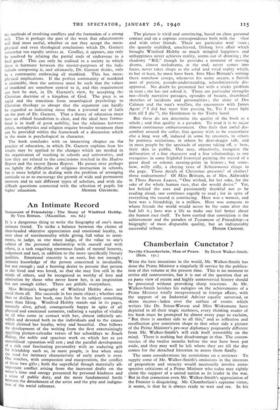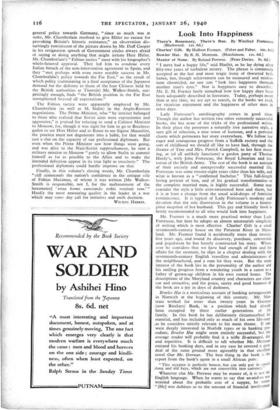Chamberlain Cunctator ?
Neville Chamberlain, Man of. Peace. By Derek Walker-Smith. (Hale. 15s.) WITH the best intentions in the world, Mr. Walker-Smith has done the Prime Minister a singularly ill service by the publica- tion of this volume at the present time. This is no moment to revive old controversies, but it is out of the question that an ex pane view of recent and highly controversial history should be presented without provoking sharp reactions. As Mr. Walker-Smith lavishes his eulogies on the achievements of a Prime Minister totally inexperienced in foreign affairs, with the support of an Industrial Adviser equally unversed, or skims incense - laden- over the surface of events which writers like Dr. Seton-Watson and Miss Wiskemann have depicted in all their tragic starkness, every thinking reader of his book must be prompted by almost every page to exclaim, "But there is another side to all this," and as reflection and recollection give consistent shape to that other side a picture of the Prime Minister's pre-war diplomacy poignantly different from Mr. Walker-Smith's will etch itself irresistibly on the mind. There is nothing but disadvantage in that. The contro- versies of the twelve months before the war have been put aside, and they may well be left where they are till the day comes for the detached historian to assess them finally.
The same considerations lay restrictions on a reviewer. To supply some of Mr. Walker-Smith's omissions in the interests of proportion and veracity would necessarily involve retro- spective criticisms of a Prime Minister who today may rightly claim the support of a united nation as its leader in the war.
• But in that corinexion even Mr. Walker-Smith's appreciation of the Premier is disquieting. Mr. Chamberlain's supreme virtue, it seems, is that he is always ready to wait and see. In his general policy towards Germany, " since so much was at stake, Mr. Chamberlain resolved to give Hitler no excuse for provoking Britain's historic resistance," an observation dis- turbingly reminiscent of the picture drawn by Mr. Duff Cooper in his resignation speech of Government circles always afraid of saying or doing anything that might irritate Herr Hitler. Mr. Chamberlain's " Fabian tactics " meet with his biographer's whole-hearted approval. They led him to condone every Italian breach of the non-intervention agreement in Spain, and they " met perhaps with even more notable success in Mr. Chamberlain's policy towards the Far East," as the result of which policy (culminating in a final acceptance of the Japanese demand for the delivery to them of the four Chinese held by the British authorities at Tientsin) Mr. Walker-Smith, sur- prisingly enough, finds " the British position in the Far East strengthened beyond all expectations."
The Fabian• tactics were apparently employed by Mr. Chamberlain (as well as M. Stalin) in the Anglo-Russian negotiations. The Prime Minister, who " by instinct belonged to those who realised that Soviet aims were expansionist and aggressive," is praised for refusing to send a Cabinet Minister to Moscow, for, though it was right for him to go to Berchtes- gaden to see Herr Hitler and to Rome to see Signor Mussolini, the practice must not degenerate into a habit, for that would cast a slur on the capacity of our professional diplomats. But even when the Prime Minister saw how things were going, and was alive to the Nazi-Soviet rapprochement, he sent a military mission to Moscow " partly to allow Stalin to commit himself as far as possible to the Allies and to make the intended defection appear in its true light as treachery." The professional diplomats could hardly improve on that.
Finally, in this volume's closing words, Mr. Chamberlain " still commands the nation's confidence in the antique role of Fabius Maximus, of whom it was written [Mr. Walker- Smith is responsible, not I, for the maltreatment of the hexameter] ' unus homo cunctando nobis restituit rem." Hardly the most reassuring quality in the leader in a war which may some day call for initiative and swift decision.
WILSON HARRIS.







































 Previous page
Previous page